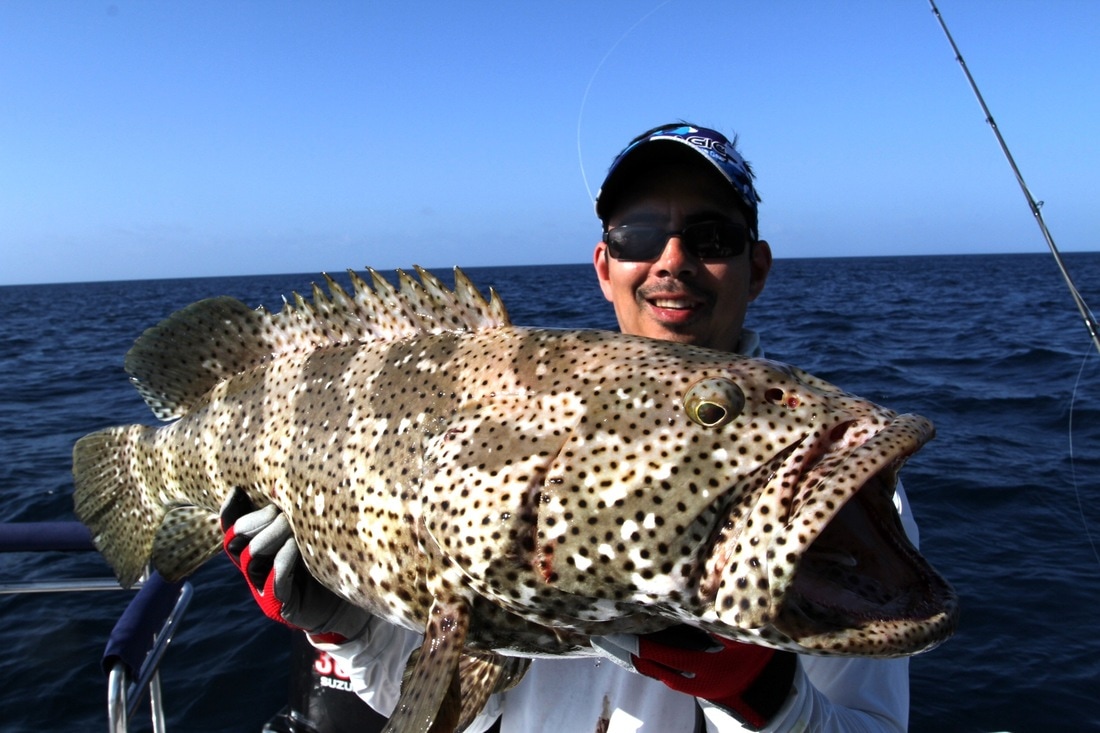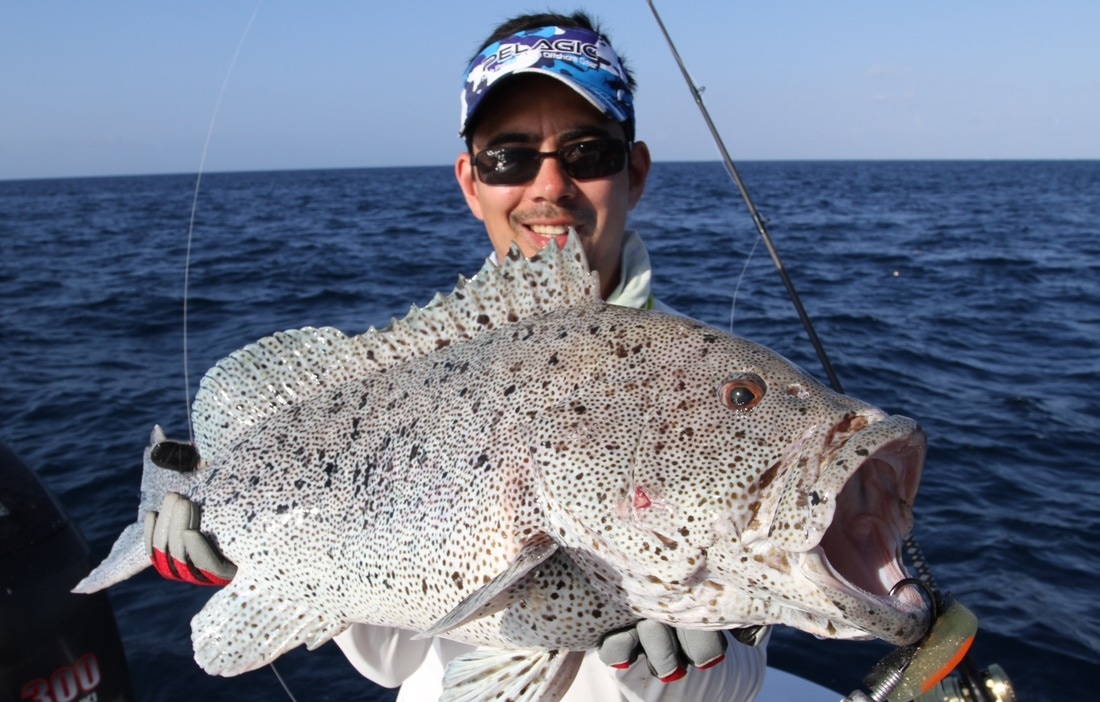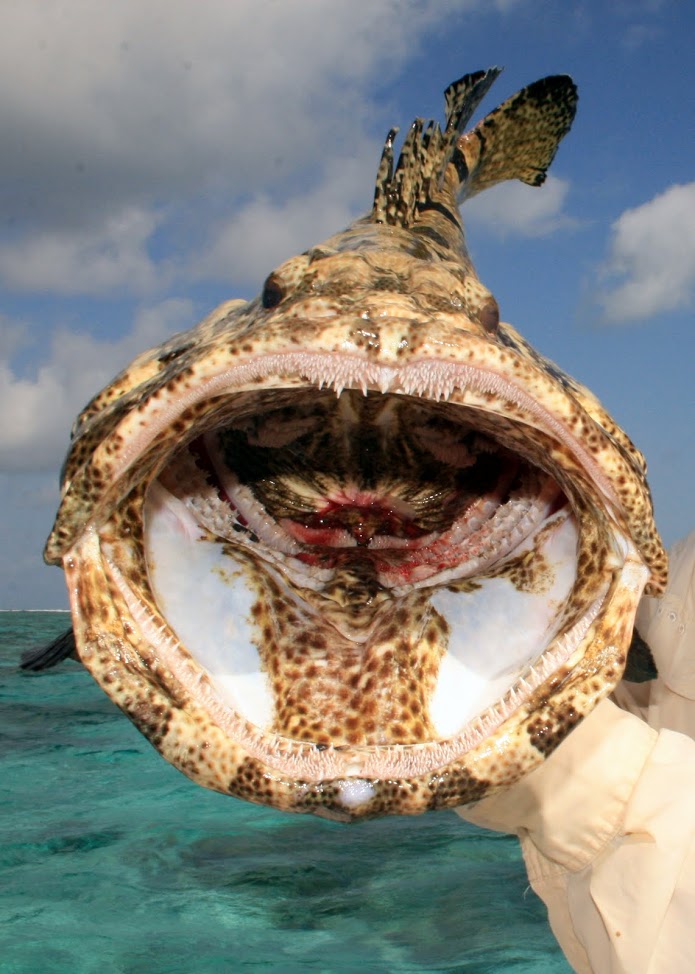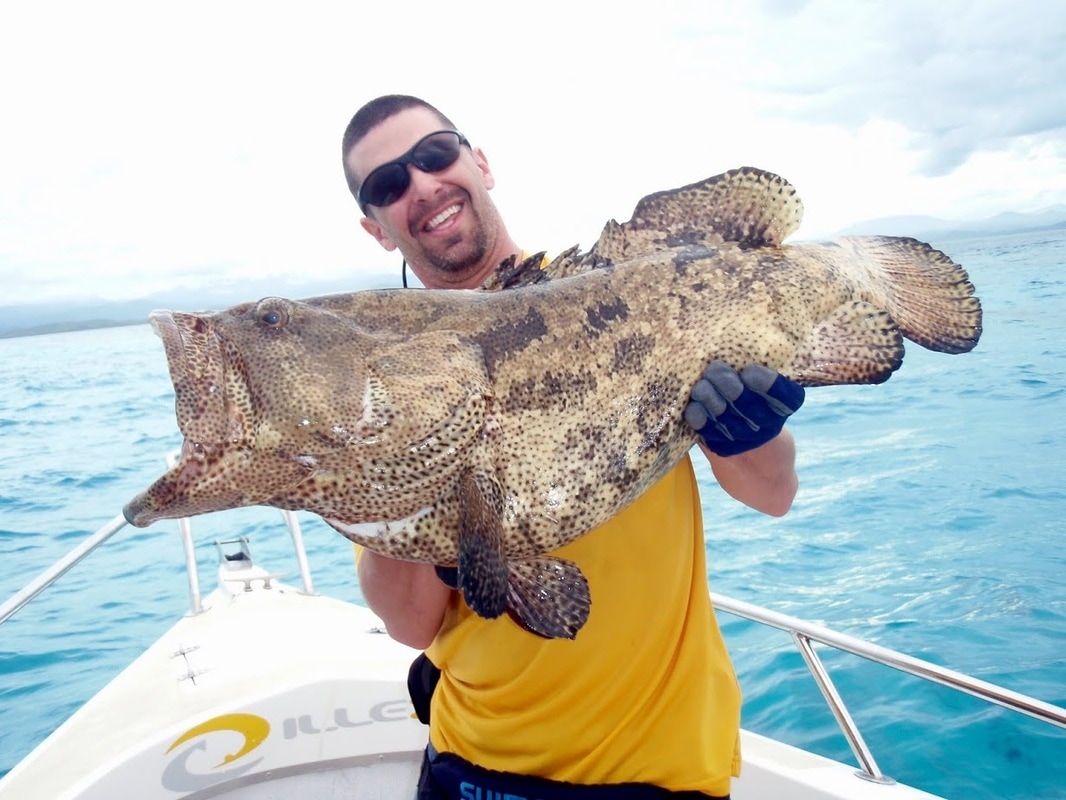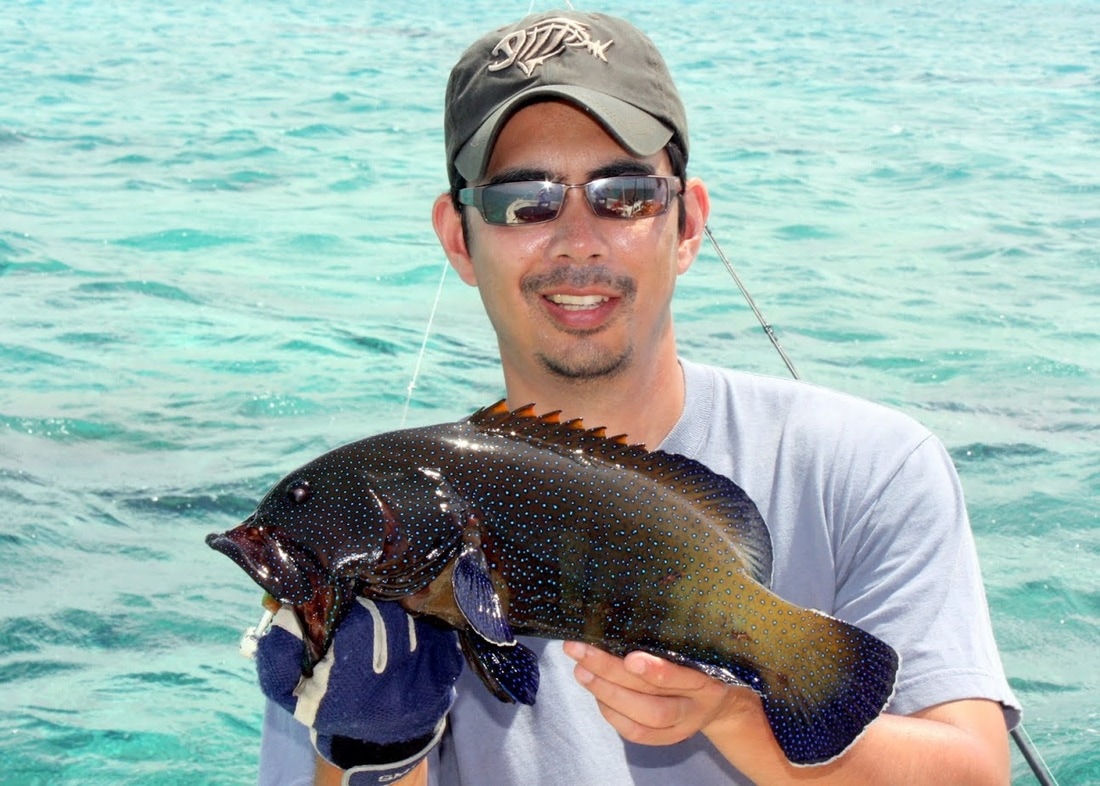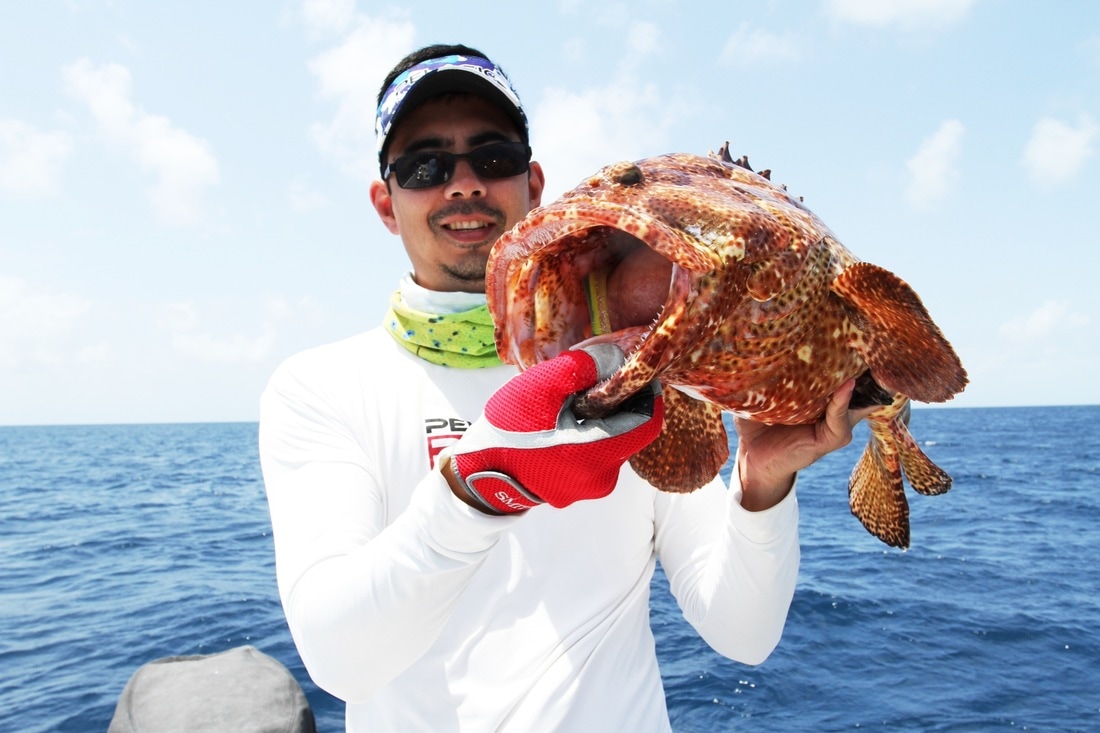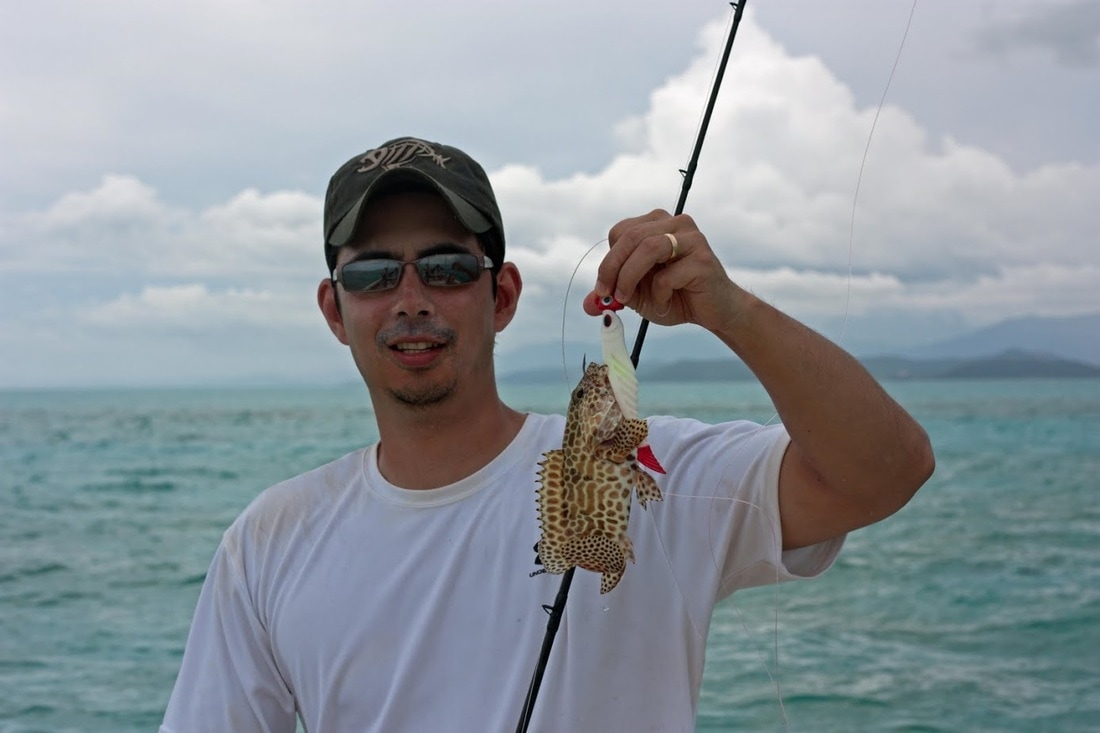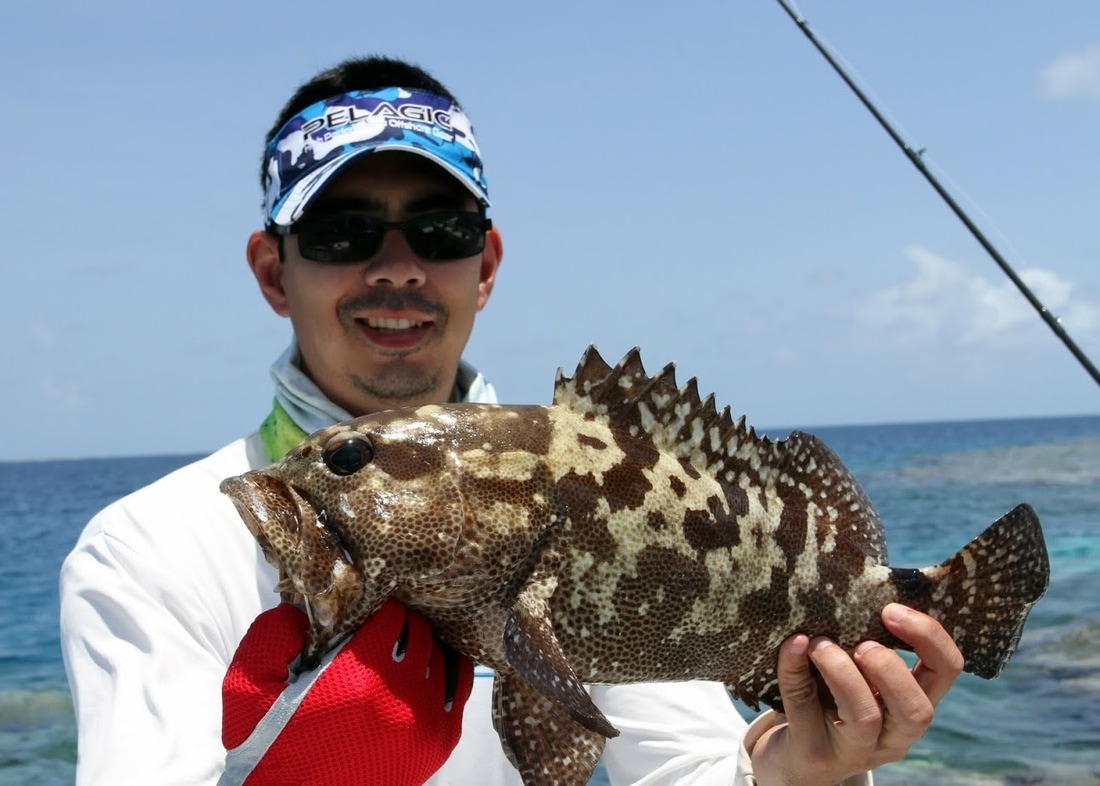Tropical Cods
Genus Epinephelus
Home
Other Species
Tropical Cod Description
I'm using the catch-all term "Tropical Cods" to describe the hundreds of different species of tropical groupers within the genus Epinephelus that in many parts of the world where they are found such as Australia are referred to as "Cods" (Note: they are not at all closely related to the fish that are commonly known as Cod in the North Atlantic and other areas). I have not caught many of these species, but they are similar enough to group together for the sake of convenience.
Most if not all of these cod species are aggressive predators and strike lures and baits with abandon. Their mouths are very large relative to their bodies and they try to cram as much as they can into them. Despite that, they are sometimes maligned as sportfish due to their un-glamorous appearance, slimy skin, and in some cases bad smell. They also don't make blistering runs or sexy jumps when hooked. However, they hit extremely hard and immediately try to bury you in the rocks. They are not pushovers. If you give the big ones an inch, they will give you a breakoff in the rocks. They are never far from structure.
Many cod start out as juveniles living in estuaries and then move out to deeper reefs as adults. Many of these juveniles (and some occasionally absurdly large adults) are caught trolling and casting in estuaries. Later in life, many of them can be caught casting and bottom fishing out on the reefs.
Many cod, especially smaller ones, are excellent eating, although you probably want to throw the large ones back. I was fishing in Australia once and there were sharks all around us trying to eat every fish that we hooked except the big cod. They left those completely alone. That probably tells you something.
Tropical Cods Pound for Pound Fight Rating - 6 out of 10 on the Saltwater Scale
Tropical Cods, like most groupers, make a mad dash for their rocky homes when hooked. That initial run is very powerful, and you need to do everything you can to keep them from getting to the rocks and breaking you off. However, their initial runs are not as powerful as some other groupers on a pound for pound basis. After their initial run, they usually come in pretty easily.
Tropical Cods Culinary Rating - High
They are slow growing and not super numerous, so I generally release them. I have never eaten one that I can remember, but I'm told some species are delicious.
Tropical Cod Tackle
People rarely target cod; they are usually bycatch. However, if you want to target big cod you should not mess around with light tackle unless you plan to donate most of it to the local reef. Go with heavy gear. Cod don't have a lot of stamina; the whole fight is won or lost in the first 10 seconds usually. Click here for tackle recommendations.
Tropical Cod Techniques
Tropical Cods are caught in a variety of ways and it is a little difficult to generalize for all of the species. Some common ways they are caught are bottom fishing with bait and lure casting around reefs and inshore structure.
Tropical Cod Lures
Soft plastics work well for all cods that I have caught. You can work paddle-tail swimbaits around structure or near the bottom and get ready to pull hard if something grabs it. A variety of jerkbaits and other lures will work. Frankly, whatever lure you want to use, if you can put it in front of the cod and make it look kind of fishy they will probably hit it. However, the key is to fish very close to the structure where they live. These are ambush predators, not open water speedsters. If you are not occasionally getting hung up on the structure, you are probably not fishing close enough.
Tropical Cod Baits
I have never fished for them with bait but I imagine they would be hard-pressed to refuse any live baitfish presented near them. I'm guessing that many dead baits like squid will work for most any species as well. These guys are not picky eaters.
Where to get the big Tropical Cod
Australia is home to many species of cod, both on the Great Barrier Reef and in other parts of the country.
Click the video below for the catch of a big cod from start to finish:
Genus Epinephelus
Home
Other Species
Tropical Cod Description
I'm using the catch-all term "Tropical Cods" to describe the hundreds of different species of tropical groupers within the genus Epinephelus that in many parts of the world where they are found such as Australia are referred to as "Cods" (Note: they are not at all closely related to the fish that are commonly known as Cod in the North Atlantic and other areas). I have not caught many of these species, but they are similar enough to group together for the sake of convenience.
Most if not all of these cod species are aggressive predators and strike lures and baits with abandon. Their mouths are very large relative to their bodies and they try to cram as much as they can into them. Despite that, they are sometimes maligned as sportfish due to their un-glamorous appearance, slimy skin, and in some cases bad smell. They also don't make blistering runs or sexy jumps when hooked. However, they hit extremely hard and immediately try to bury you in the rocks. They are not pushovers. If you give the big ones an inch, they will give you a breakoff in the rocks. They are never far from structure.
Many cod start out as juveniles living in estuaries and then move out to deeper reefs as adults. Many of these juveniles (and some occasionally absurdly large adults) are caught trolling and casting in estuaries. Later in life, many of them can be caught casting and bottom fishing out on the reefs.
Many cod, especially smaller ones, are excellent eating, although you probably want to throw the large ones back. I was fishing in Australia once and there were sharks all around us trying to eat every fish that we hooked except the big cod. They left those completely alone. That probably tells you something.
Tropical Cods Pound for Pound Fight Rating - 6 out of 10 on the Saltwater Scale
Tropical Cods, like most groupers, make a mad dash for their rocky homes when hooked. That initial run is very powerful, and you need to do everything you can to keep them from getting to the rocks and breaking you off. However, their initial runs are not as powerful as some other groupers on a pound for pound basis. After their initial run, they usually come in pretty easily.
Tropical Cods Culinary Rating - High
They are slow growing and not super numerous, so I generally release them. I have never eaten one that I can remember, but I'm told some species are delicious.
Tropical Cod Tackle
People rarely target cod; they are usually bycatch. However, if you want to target big cod you should not mess around with light tackle unless you plan to donate most of it to the local reef. Go with heavy gear. Cod don't have a lot of stamina; the whole fight is won or lost in the first 10 seconds usually. Click here for tackle recommendations.
Tropical Cod Techniques
Tropical Cods are caught in a variety of ways and it is a little difficult to generalize for all of the species. Some common ways they are caught are bottom fishing with bait and lure casting around reefs and inshore structure.
Tropical Cod Lures
Soft plastics work well for all cods that I have caught. You can work paddle-tail swimbaits around structure or near the bottom and get ready to pull hard if something grabs it. A variety of jerkbaits and other lures will work. Frankly, whatever lure you want to use, if you can put it in front of the cod and make it look kind of fishy they will probably hit it. However, the key is to fish very close to the structure where they live. These are ambush predators, not open water speedsters. If you are not occasionally getting hung up on the structure, you are probably not fishing close enough.
Tropical Cod Baits
I have never fished for them with bait but I imagine they would be hard-pressed to refuse any live baitfish presented near them. I'm guessing that many dead baits like squid will work for most any species as well. These guys are not picky eaters.
Where to get the big Tropical Cod
Australia is home to many species of cod, both on the Great Barrier Reef and in other parts of the country.
Click the video below for the catch of a big cod from start to finish:
